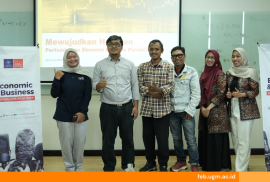Thursday (18/01), the Master of Science and Doctoral Study Program, Faculty of Economics and Business, Universitas Gadjah Mada (MD FEB UGM) held a public lecture with the topic “Generative Artificial Intelligence (GAI) ‘s Effects on the Financial Services Industry”. The resource person on this occasion was Prof. Nir Kshetri of the Bryan School of Business and Economics, The University of North Carolina-Greensboro. This public lecture was held at the BRI Auditorium on the 3rd floor of the MD FEB UGM Building and broadcast online via Zoom Meetings
Generative Artificial Intelligence (GAI) has great potential to revolutionize the financial services industry landscape. Its strategic integration not only provides long-term benefits, but also creates the basis for sustainable competitive advantage. By leveraging abundant customer data, banks can gain accurate insights into behavior, preferences and risks, enabling more informed decision making. Additionally, GAI facilitates the dismantling of data silos, increasing efficiency across functions such as legal, engineering, and marketing. These operational cuts not only optimize resource use but also create a more agile and responsive organizational structure, better equipped to adapt to evolving market dynamics.
In addition, GAI acts as a strong facilitator for strengthening cyber security within financial institutions. With its ability to predict and mitigate cyber threats through scenario simulation and real-time anomaly detection, GAI offers a proactive approach to protecting sensitive financial data. Examples such as Stripe’s fraud detection and Cowbell’s insurance underwriting platform illustrate GAI’s transformative potential in improving cybersecurity measures. Additionally, GAI-fueled innovation stretches into the realm of synthetic data, offering new solutions to challenges such as fraud detection and risk assessment. These advances not only strengthen the resilience of the financial system, but also pave the way for greater trust and confidence among stakeholders in the digital financial ecosystem.
Implementing GAI in the financial sector involves various challenges that must be overcome for it to be effective. One of the main challenges is explaining the complex decision-making processes of GAI systems, which often operate like “black boxes”, making it difficult to understand their reliability, accuracy, and potential biases. This lack of transparency not only makes it difficult to assess the information produced by GAI, but also raises concerns about the fairness and accountability of the decisions it makes. Additionally, the sophisticated fraud risks associated with GAI also exacerbate these challenges, requiring a deep understanding of emerging fraud tactics to develop robust mitigation strategies in financial services.
Another obstacle in implementing GAI in the financial sector is handling structured and unstructured data. While the banking sector has become adept at leveraging structured data, incorporating GAI into processes that rely on unstructured data, such as natural language processing, poses its own challenges. Limited computing power and the complexity of unstructured data limit the capabilities of AI systems, requiring innovative solutions to optimize their potential. In addition, applying GAI for interactions with customers also brings its own challenges, including the risk of manipulation and dissemination of inaccurate information. Despite its potential to improve customer service efficiency, maintaining the integrity and reliability of AI-driven interactions remains a key focus for financial institutions.
Reportage: Adella Wahyu Pradita







